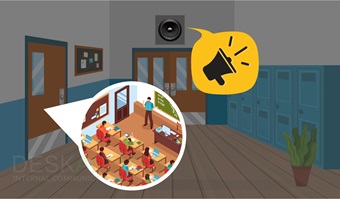Avigilon, a Motorola Solutions company, has recently produced a school safety guide which explores the topic of school security, the measures that many schools are already taking and additional measures that will help to enhance existing systems. Here the company shares its expertise on the subject with a view to fortifying campus safety with emergency notification and panic alert systems.
Emergency preparedness is central to the safe operation of all modern educational institutions. Emergencies such as intrusions or natural disasters can occur with minimal warning, meaning school administrators, staff and students must possess the tools to enact responses quickly.
Recently published data from Pew Research Center reveals that 98% of US schools utilise access control, while 73% operate security doors that can be locked from inside. These tools can be strengthened with support from dedicated campus alert systems and school emergency notification systems.
School mass notification systems and panic button systems for schools ensure first responders are notified of emergencies immediately. This improves incident response times to protect campus residents from ongoing threats. To learn how to implement panic buttons in schools safely, this post will cover how to fortify your school safety technology with emergency notifications and panic alert systems.
A network of notification systems
A school emergency alert system is a specially designed network of communications devices programmed to notify first responders of suspected emergencies. An effective emergency alert system will allow security teams to send fast and reliable notifications to first responders and authorities and provide students with guidance on how to respond to emergencies safely.
Emergency alert systems typically utilise multiple forms of communication to warn stakeholders of ongoing incidents, including a school text alert system, PA alerts and mobile SMS alert communications.
Mass notification systems, including school notification systems, utilise two of the following four layers of communication to ensure stakeholders receive essential notifications: indoor, outdoor, personal, and public.
According to Avigilon, an intelligently designed school alert system will ensure administrators and security teams can deliver critical safety information promptly and efficiently. To achieve this, several core features must be prioritised, including the ability to:
- send alerts to multiple devices simultaneously
- utilise multiple channels of communication
- alert relevant authorities of ongoing emergencies
- provide authorities with critical safety information
- provide residents with clear instructions regarding safety
Panic buttons for schools
Panic button systems for schools are specialised communications devices that enable residents to notify first responders of emergencies immediately. When pressed, a school panic button sends an instant signal to authorities requesting an emergency response. These systems’ immediate and discrete nature allows residents to request support during various emergencies safely.
Teams can choose to deploy these devices as a school silent panic button system, meaning alerts will be sent to authorities without activating audible alarms, or as a trigger to arm wider school security systems, alarms and devices. Bespoke installations can be created to ensure all types of emergencies are addressed appropriately, measurably improving school security responses.
The importance of school emergency notification systems
Emergency notification systems for schools are essential to ensure the safety of students, staff and visitors. Security teams can ensure emergencies are always addressed quickly and effectively by developing a system in which residents can quickly alert authorities, provide first responders with actionable information regarding threats, and warn campus residents of ongoing incidents.
Recent reports reveal that almost 75% of schools utilise multiple emergency notification systems to improve incident responses, highlighting the importance of school emergency notifications in creating effective security plans. Further benefits associated with mass alert systems include bespoke responses, personal safety, unique integrations and provide fast response times.
Improved preparedness for a variety of issues
School emergency notification systems and panic buttons for schools can be used to improve preparedness for a range of common emergencies. Critical situations such as severe weather events and natural disasters, intrusions, chemical leaks, and active threat events require fast and effective communication to ensure the safety of campus residents.
Prompt and appropriate action
Panic buttons and school emergency notification systems are essential components of an effective campus security system, ensuring incidents are handled promptly and appropriately. Developing systems that notify authorities instantly, offer residents guidance and activate wider security tools will improve incident responses, protecting students from potential threats.
Source: SECURITY WORLD MARKET


